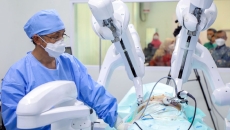Precision Medicine
The expansion aims to connect the western and eastern islands at a distance of 3,500 kilometres.
A new law passed in New York and legislation introduced in Ohio are just two of the latest examples of a legislative push to expand insurance coverage for biomarker testing.
Also, FPT has closed a deal to exclusively distribute Nipro's blood glucose monitors in Vietnam.
The agency said the new strategy is critical to achieving its goal of reducing cancer deaths by 50% and improving the burdens of cancer treatments on patients and families.
AI & ML Intelligence
A healthcare consultant discusses how automation is enabling more tailored engagement that can help patients better adhere to their care plans and deliver a more personalized care experience in general.
The organization reported that it detected intrusion over the Thanksgiving holiday. All clinics and the MyChart patient portal are operating.
A new report points out India's enormous potential to become a global medical device powerhouse.
A new competition could give as many as four health tech or life sciences companies 24 weeks of access to IBM Quantum System One, along with insights from health system clinicians and other education.
Researchers will use $40 million in funding to develop quantum algorithms and workflows. They will also partner with Algorithmiq on a second initiative to create computational tools that demonstrate quantum advantage.
A pioneering trial between Singapore and Japan has proven that it is feasible.








